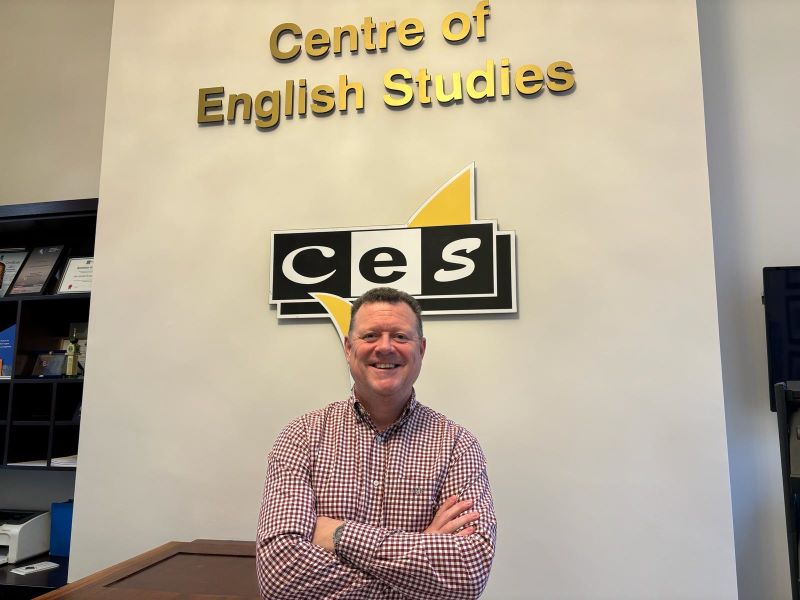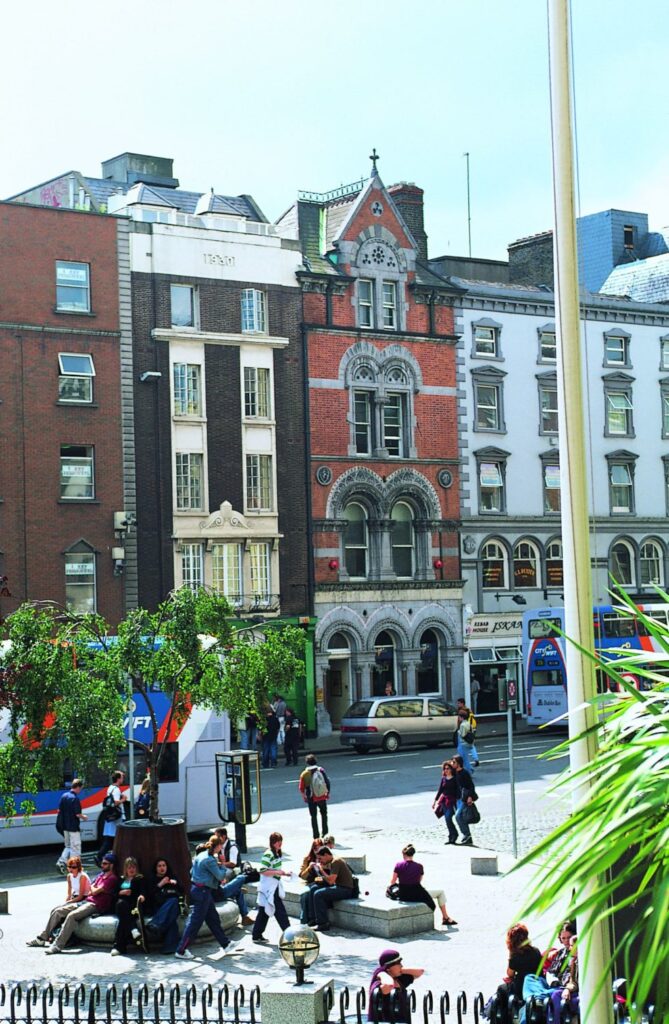Meet the Director – Jonathan Quinn Marketing Director CES Schools.
- Can you tell us about the inspiration for starting your language centre?
- What would you say was some of the biggest challenges you faced when starting your business and how did you overcome them?
- What values or principles guide your company’s operations?
- How do you maintain a strong company culture?
- How do you foster collaboration and teamwork?
- How do you incorporate sustainability and corporate social responsibility within your company?
- What do you personally consider to be the benefits and opportunities from Erasmus+ for participants and institutions?
- What are your goals and aspirations for the future of your business?
Can you tell us about the inspiration for starting your language centre?

Rosemary Quinn set up the centre in the early 70s, she ran a Summer camp called “The St. Paul’s Summer School”, this is going back 40, 50 years ago, which was based in St. Paul’s College. St. Paul’s is where Justin, myself, my older brother, Nyle, went to secondary school, here in Dublin. Rosemary Quinn was a speech and drama teacher, so the summer camp was initially for Irish kids, pupils of St. Paul’s and their school friends. It was a typical old style Irish summer camp with arts and crafts, Irish dancing and some outdoor activities. Then it kind of developed and changed in that some of the Irish students wanted to bring their foreign friends over to join the program. That further developed to where Rosemary could see that there was a possibility of bringing in English language students in tandem with the summer camp and very quickly the Summer School model changed, the language school just seemed to take over.
So it was a just summer school program initially, and then it developed in the mid to late 1980s. We had about six classrooms, located next to St Paul’s College, still outside the city center, then the seismic move really happened in 1991. Rosemary took the business out of St Paul’s College and set up the Centre of English Language Studies on Dame Street, which is now CES-Centre of English Studies, we bought this building in 1991. So we had eight classrooms in the city centre on Dame Street, which was a completely different city in those days. You know, Temple Bar didn’t exist way back then.
The business slowly developed and as the school started to grow, there was an option for me to join, so I joined in about 1995. Then in 1996, we purchased a second building, Coppinger Row, which had, 11 more classrooms. Michael joined in the early 2000s and at that stage we were getting to where we we either expanded in Ireland or we expanded somewhere. We bought the Swandean English language School back in 2005. We were Worthing in Wimbledon, and then in 2011, we purchased Leeds Languages, which then became CES Leeds 2012. We purchased Oxford House School of English, which then became CES Oxford 2013, I think it was a 2014, we purchased Harrogate Language Academy, which then became CES Harrogate, and then Randolph School of English in Edinburgh, which then became CES Edinburgh. Then the next big move was taking over Global Village in Toronto in 2018. And then in 2022, the final piece to the jigsaw was Vancouver, and we took over a building that had been Sprachcaffe.

So we currently have eight schools in the portfolio. The Dublin school is a big, big operation. We’ve got 35 classes operating pretty much constantly with 15 to 20 classes of juniors running constantly between now and September (in the afternoons). We are very lucky to now have three city centre locations, one of which is going to be a dedicated teacher trainer centre and for Erasmus plus groups coming which is located directly behind it here just off Dame Street. It’s about a five minute, four minute walk from Grafton Street. So you’re in the very, very heart of Dublin City. One big benefit of coming to CES is that, not only are you going to get excellent teaching because we have a dedicated teacher training, overseas teacher training team and a CELTA team. But you’re also getting DELTA qualified teachers and also you’re in a location whereby on the days or the afternoons that you’re not in class, you can be discovering Dublin because it is literally on their doorstep. Temple Bar is across the road from us here. Trinity College is just down the road. Christchurch Cathedral, St. Patrick’s Cathedral, Dublin Castle are all five to 10 minutes walking. Erasmus Plus participants can choose either their accommodation in the city center, if they wish to take it because we have self-catering university residential accommodation in the city center that’s within walking distance.
What would you say was some of the biggest challenges you faced when starting your business and how did you overcome them?
Getting the correct location for your centers is vital and then attracting the right kind of people is vital in terms of your teacher training staff and your teachers. You need to become a school where teachers want to teach where teachers know that they’ll be nurtured and receive continuous training and grow and develop. We’ve always been very conscious of the fact that you need to try and offer the best that you can. The level of quality within Irish schools increased dramatically in recent years, but you still have to maintain, you know, be consistent with those levels of quality, and that’s one of the most demanding things. That’s one of the reasons why CES was one of the first schools that joined Equals in Ireland, to be part of an accreditation association whereby you are constantly being monitored and checked for excellence.
What values or principles guide your company’s operations?
It’s excellence of service – the Center of English Studies. We broke it down to CES – Care, Excellence and Success with the idea is that everybody that walks through the door is treated as number one in the same way that we expect them to have very positive feedback by the time they’re leaving.
Which is it’s a demanding lofty aspiration, but it’s one that we think that we achieve so that and that from the person on reception, to the social and welfare team, to the teacher when they walk into the class that what you’re trying to do is create the culture of making sure that the clients their needs in are being listened to. And that’s very much top down. So in Dublin we would be managing meetings with all members of the team from accommodation to accounts to academic to make sure that we know who’s coming in, who’s leaving, what specific requirements are for whatever they are, how many classes we have.
How do you maintain a strong company culture?
It’s constant. For example, we have the a weekly senior management team meeting. And then, two hours after our senior management team meeting, we will have a general staff meeting so everyone knows exactly what’s happening with clear communication and transparency. Every Friday, all our teachers meet with the academic managers.
How do you foster collaboration and teamwork?
So you have your accommodation team, you have your marketing and admin team, you have your academic team and your teachers. As long as there’s clear communication key you all know what’s happening, when, how and why is it happening and who’s doing what. We have an annual general meeting (that we held recently in Malaga) where everybody gets together to discuss the general plans. The background to of all this is something we have is called CES One, which is a document that we have internally to align us to follow the same levels of quality in the eight different schools. We also get together for various social events – I think we had 69 at the Christmas party here in Dublin. We also do a mid summer barbecue for all teams from the junior schools as well as the city centre. We take care of our staff and they feel cared for and enjoy working at CES. In Dublin, around 50% of the teachers have been with us a long time, as have many of the management team – the academic director has been with us at least 15 years!
How do you incorporate sustainability and corporate social responsibility within your company?
We’re trying to obviously limit the amount of traveling that we do to lower our carbon footprint, but when you’re running eight different schools and three different continents it’s not always easy. We’re also very conscious of different staff members needs and requirements. We recently opened our first gender neutral toilets in one of our centers. We have reduced paper use dramatically and all our shared teaching materials are on SharePoint for the teachers so they can all upload documents. We just noticed that a few years ago that the amount of photocopying that was being done was ridiculous. We changed our electricity provider so it’s green energy here that we’re using and in all of the buildings we installed LED low emissivity lights and the motion sensors, so all the lights turn off once the classroom is empty. So it’s baby steps, put it like that, we are trying our best.
What do you personally consider to be the benefits and opportunities from Erasmus+ for participants and institutions?
A lot of these people that will be coming over are highly educated and it’s the exciting prospect of them sitting in a classroom with people from all over Europe, who are in a relatively similar position, who probably have similar stories, but haven’t shared them. Then getting different perspectives from our trainers. It’s an opportunity for them to hear new ideas and to listen to people who have the same challenges, but the same challenges in different countries, and how their national association or union may approach these different types of problems. It’s bringing Europeans together, it’s a forum for discussion, which is unique, but it’s not just in the classroom. They’ll get a chance to see Dublin and also be with colleagues from across Europe while they’re doing this and who will have a shared learning experience by the time they go home. For a long time, we’ve been doing specific programs, CLIL and Blended Learning, but now there are new programs and courses that are coming online from Erasmus plus that we’re seeing like our new Mindfulness for Teachers, which is an exciting new development.
What are your goals and aspirations for the future of your business?
We’re expanding our portfolio of Erasmus Plus to hopefully offer them year-round. We’ve just done a big project, for example, for secondary school teachers in with English UK, the British Council, and Brazil. So it’s to encourage our teachers to develop different courses and programs, and ensure they are happy and content to teach those programs, and then it’s just to roll it out!
Learn more about CES – Centre of English Studies
